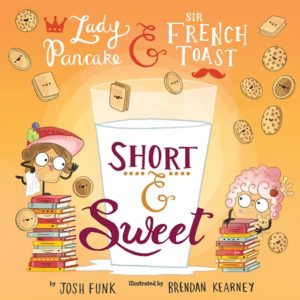
Dear OPB family, it’s with great pleasure that I’m able to bring you an all-time OPB fave, Josh Funk. (Please note references in previous posts such as Jamie LB Deenihan’s interview, a review of one of Josh’s books, and this interview by literary agent Kaitlyn Sanchez, which reveal just a bit of the Funkalicious fan clubbing we’ve got going on here!).
With a writing career as big as Josh has (coupled with a full-time day job!), getting this interview to work out took some finessing, but we did it thanks to his generosity and some fortuitous timing related to his new book, Short & Sweet, coming out. So, yay! And a syrupy hooray!
You probably know a lot about him already, but just in case not, he provides a Mad-libs-style bio on his website. Here’s the template:
Josh enjoys _______ during ________ and has always loved __________. He has played ____________ since age __ and his biggest fear in life is being eaten by a __________.
And here are what I can only assume are the totally-true-fact answers he fully expects everyone to come up with from this interactive bio.
Josh enjoys living one day at a time powered by the awesomeness of a freshly baked cookie during his weekly attempt to make the Kessel Run in less than twelve parsecs, and has always loved putting the “elation” in writerly “public relations.” He has played the role of a passionate cherry limeade lover since the moment he reckoned to be a force to reckon with, and his biggest fear in life is being eaten by a vampire porpoise that sometimes just wants to give it all up and become a handsome aquatic billionaire.
Just in case that’s not yet enough of a deep dive into All Things Josh, I’ll add these final even-truer-than-those-facts facts sleuthed up by our crack research team (consisting of a single penguin intern named Lefty who’s an especially gifted napper), with a little help from Josh himself.
Josh is:
- a member of The Writer’s Loft in Sherborn, MA
- a former fantasy football wunderkind
- a long-time vegan
- a musician who created songs to pair with his picture books
- a candy corn aficionado
- a fan of sewing
- someone who still sleeps with the same stuffed animal he’s had since he was a kid (a Tropical Puffalump named Monkey Dude).

Alright, let’s get to it. Unleash the interview! (But if you want some Funky social media stuff, here are places to go, too.)
- https://www.joshfunkbooks.com/
- https://www.facebook.com/Josh.Funk.Books
- https://www.goodreads.com/author/show/8642874.Josh_Funk
- https://www.instagram.com/joshfunkbooks/
- https://twitter.com/joshfunkbooks
- https://www.youtube.com/c/JoshFunkBooks
RVC: Welcome to the world of Only Picture Books, Josh!
JF: Thanks for all of the kind words, Ryan! It’s a pleasure to join you.
RVC: Once people knew you were visiting OPB, they all insisted I ask you about rhyme, so let’s start with that. While I realize you can talk for days on the topic, help us understand a specific way or two that we might move from amateur rhymes to elegant ones.
JF: Great question! The most important thing you need to consider is that to be a successful book, loads of different people are going to be reading these words (agents, editors, reviewers, librarians, teachers, parents). However, not everyone pronounces words the same way you do. The English language, even just in the U.S., has many different accents and you want ALL of those accents to pronounce your words properly. So pay attention to each word and each syllable and each whatever-is-less-than-a-syllable (I’m not a linguist)!
There are only ~549 words in a picture book–take the time to make sure each one is PERFECT.
RVC: What’s more important? Rhythm or rhyme?
JF: That’s a trick question. The most important aspect of a rhyming picture book is the STORY. If it’s not a good book without the rhyme, it won’t be good when you add the rhyme.
But between rhythm and rhyme, RHYTHM is more important. It’s harder to learn and more important to focus on. Any first grader can rhyme. Rhythm can be very tricky.
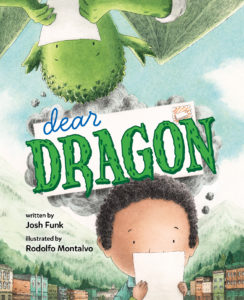 RVC: Which of your books gave you the most trouble in terms of getting rhymes to really sync up in the way you need them to? I’m going to guess Dear Dragon because of all those pen pal letters. But, you know, pastries! And fairy tale folk!
RVC: Which of your books gave you the most trouble in terms of getting rhymes to really sync up in the way you need them to? I’m going to guess Dear Dragon because of all those pen pal letters. But, you know, pastries! And fairy tale folk!
JF: I don’t really think of rhymes as tricky. Writing a rhyming picture book is more like a puzzle–and I enjoy solving puzzles. There’s always another way to say something. If I can’t get a word to rhyme properly, I’ll use a thesaurus and replace it with another that will work.
RVC: Volume four of the Lady Pancake & Sir French Toast series comes out this month—Short & Sweet. Congrats on that! Is it getting harder or easier to write sequels for your various series?
JF: In general, as long as I have a good story mapped out for characters I’ve written about previously, writing sequels gets easier. I have a sense of what the pacing will be, what the illustrator will be able to add, and a general sense of what I want to do to differentiate one book in each series with the next.
RVC: Just curious—are the publishers asking for sequels beyond those required in your contract, or are you pitching new ideas to extend any of your series beyond what anyone initially expected?
JF: It’s a combination of both. Usually my agent and I approach the publisher with ideas to see if they’re interested. And most of the time, the answer is based on two factors:
1) Did the previous book do well?
2) Is the new story one worth telling?
I’ve been very fortunate that several of my books have performed well enough that publishers considered the sequels.
RVC: What’s the elevator pitch for Short & Sweet?
JF: Each book in the series is a different genre, which I think keeps each of the stories fresh (pun intended). Lady Pancake & Sir French Toast is a race. The Case of the Stinky Stench is a mystery. Mission Defrostable is an action-adventure/spy-thriller.

And Short & Sweet is a combination of a scifi-comedy (think Honey, I Shrunk the Kids or The Absentminded Professor) mixed with a magical-bodyswap (like Freaky Friday or Big). In this one, Lady Pancake and Sir French Toast begin to grow stale and visit Professor Biscotti who has a DE-spoiling ray. Unfortunately, they shrink back into toddlers and run amuck through the fridge causing culinary chaos once again.
If I get to write more, maybe it’ll be an alien invasion or horror. Who knows?
RVC: If might suggest a genre, I’d say Western featuring their Old West ancestors in a breakfast saloon. “There’s not enough room on this here plate for the two of us…”
But let’s circle back to you. What was the biggest challenge you had in writing Short & Sweet?
JF: The ending. Not the plot part of the ending (Lady Pancake and Sir French Toast return to normal), and not the final page (of course there’s a party at the end and a gatefold), but the emotional wrap-up. Figuring out how to show the character changes and saying it concisely–that spread took several emails back and forth to and from my editor–and she was right to keep pushing me, because it took a while to get right.
RVC: Got a favorite rhyme from Short & Sweet?
JF: Not yet. But maybe after I read it a few hundred times I’ll be able to pick one. Ask me again in a few years.
RVC: Will do. I’ve got you down for an interview part II thing in October 2022. Put it in your Google calendar, please!
JF: Actually, I’m washing my hair that month. Maybe November?
RVC: Deal.
Now, while every author is in some way every character they write, who has more Josh Funk DNA—Lady Pancake or Sir French Toast?
JF: Baron von Waffle.
Lady Pancake and Sir French Toast were inspired by my kids–but deep down, I know that I’d sacrifice myself and have the last drop of syrup if it stops my kids from bickering.
RVC: What else are you working on these days? What books should we be looking for from you in the near-ish future?
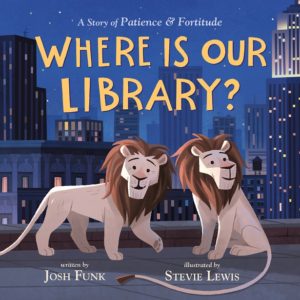 JF: I have two books coming out on October 27th, 2020. Where Is Our Library?: A Story of Patience & Fortitude, the sequel to Lost in the Library, in which the two lion statues that guard the New York Public Library on 5th Avenue venture into the children’s room one night, only to find that all of their books have gone missing. Together they search throughout all of Manhattan for their books, visiting literary statues (like Alice in Wonderland and Hans Christian Andersen) and other library branches before finding them … well, you’ll have to read the book to find out.
JF: I have two books coming out on October 27th, 2020. Where Is Our Library?: A Story of Patience & Fortitude, the sequel to Lost in the Library, in which the two lion statues that guard the New York Public Library on 5th Avenue venture into the children’s room one night, only to find that all of their books have gone missing. Together they search throughout all of Manhattan for their books, visiting literary statues (like Alice in Wonderland and Hans Christian Andersen) and other library branches before finding them … well, you’ll have to read the book to find out.
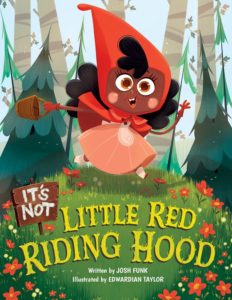 On that same day, the third book in the It’s Not a Fairy Tale series is being released: It’s Not Little Red Riding Hood. In this tale, our beleaguered narrator tries to tell the traditional story of Little Red Riding Hood, but Red rips her hood and borrows her sister’s blue one, the Wolf calls in sick and is replaced by Captain Hook, and pretty much nothing goes according to plan.
On that same day, the third book in the It’s Not a Fairy Tale series is being released: It’s Not Little Red Riding Hood. In this tale, our beleaguered narrator tries to tell the traditional story of Little Red Riding Hood, but Red rips her hood and borrows her sister’s blue one, the Wolf calls in sick and is replaced by Captain Hook, and pretty much nothing goes according to plan.
RVC: Sounds like a frolicking good time. I’ll be sure to check it out.
Now, you’re often noted as someone who handles book PR better than most. What are two specific things most authors don’t do (or don’t do right) when it’s time to get out there and plug new books?
JF: Well, it’s important to start building your network early. Like now. Before you have an agent or a book deal. Or at the latest, as SOON as you have a book deal–before it’s announced for sure. If you don’t build your network soon, you’ll run into problem number two, which is: don’t say “buy my book.” Ever.
You can share all the good news you have (“I sold a book!” or “I got a good review!” or “Here’s my cover reveal!”), but never say “buy my book.”
RVC: Book trailers. What kind of mileage are you getting out of them?
JF: It’s nearly impossible to tell. But I figure every little thing could possibly help get word of my books out there. And I enjoy making trailers. Some of the best marketing advice I ever received is to do what you like–and conversely, don’t do what you don’t like.
I like making musical book trailers. So I keep making them. I have no idea if they lead to many book sales. But, going back to the previous question, saying “check out my book trailer!” is not saying “buy my book”–yet it still gets my book out there … so why not make them?
RVC: One last question for this part of the interview. What’s the one question you’ve been waiting for someone to ask in an interview, but no one’s teed it up for you yet?
JF: What were Lady Pancake & Sir French Toast going to do with the syrup if they got it?
RVC: How can I NOT ask that question now, right? So, what’s the answer? What WOULD they do?
JF: I don’t know.
RVC: Alrighty, Josh. It’s time to shift gears from Standard Interview Mode to all that’s required of you to succeed in the Sudden-Death-Quadruple-Overtime-No-Holds-Barred Wrap Up. Are you READY?
JF: Maybe?
RVC: Favorite picture book villain?
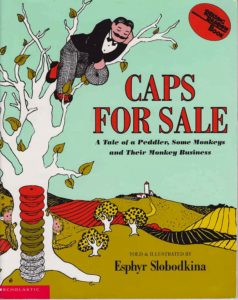 JF: The monkeys in Caps for Sale.
JF: The monkeys in Caps for Sale.
RVC: What secret talent does Sir French Toast have that nobody would ever suspect?
JF: He’s a musical theater triple threat.
RVC: What does Baron von Waffle do for fun when he wants to get away from the world of books and breakfast?
JF: Plays NBA2K.
RVC: Rumor has it Lady Pancake’s secretly writing a tell-all. Any idea what the title might be?
JF: Fresh Takes: From Flour to Fame
RVC: I’ve got a universal translator for catspeak on backorder at Indiegogo. If it ever arrives and I pop in the bio your cat wrote for you, what will it say?
JF: “Josh Funk cleans my poop and feeds me.”
RVC: Five things we’d see if we checked out your fave writing place.
JF: Coffee, Sharpies, coffee, laptop, and coffee.
RVC: A recent picture book where you absolutely loved the rhyming.
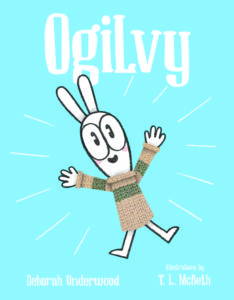 JF: Ogilvy by Deborah Underwood and T. L. McBeth.
JF: Ogilvy by Deborah Underwood and T. L. McBeth.
RVC: Two lines that sum up your picture book aesthetic. (FYI—if this isn’t a rhyming couplet, the comment section below might explode like an overfilled jelly donut that got squooshed by a woolly mammoth!)
JF:
Goofy, silly, sometimes smart,
Funny with a little heart.
RVC: Thanks a zillion for swinging by today, Josh. Best of luck with the new books! And if you’d ever like to be part of a non-Monday Bonus Goody for OPB, let me know. We’ll cook something up! I’ll bring the blog, you bring the pastries.
About Lady Pancake & Sir French Toast: SHORT & SWEET
- “A series that just keeps improving, with an adorable couple taking center stage. A must purchase.” — *Starred Review* from School Library Journal
- “The quality remains consistently high for this series, linking edibles and emotions with excitement and ease.” — Kirkus Reviews


